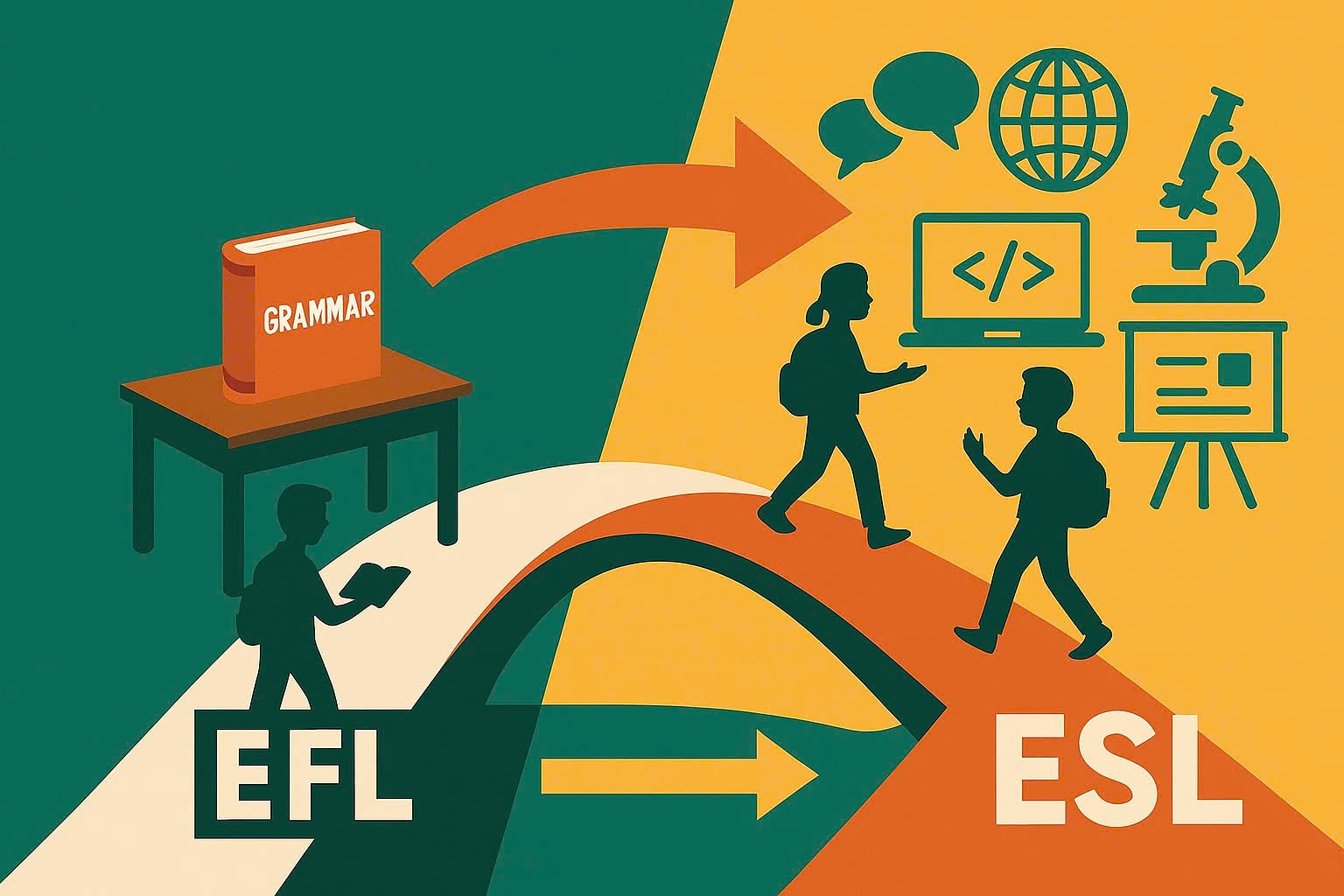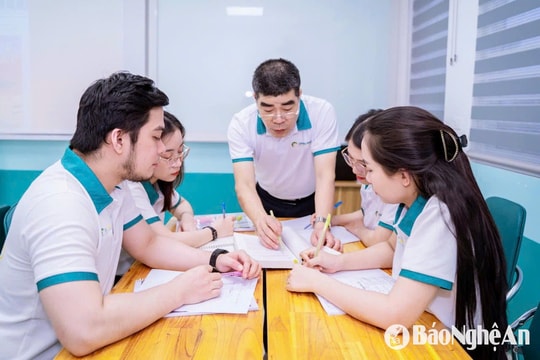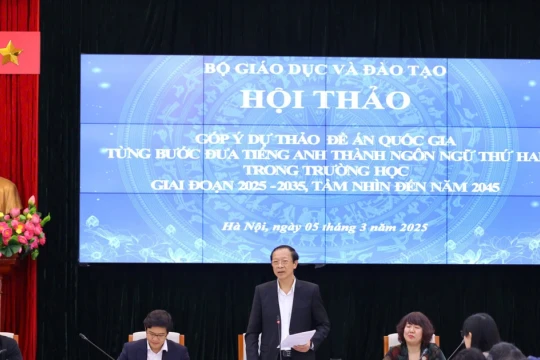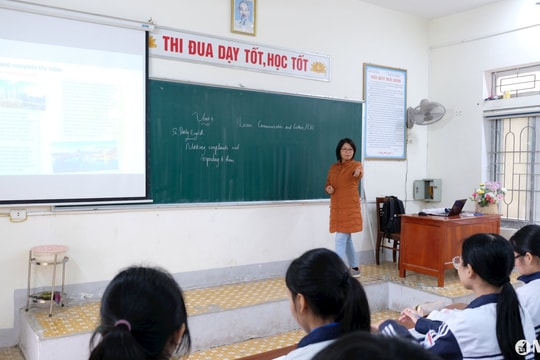Making English a Second Language in Schools:From golden opportunity to systemic challenge
The project “Making English the second language in schools for the period 2025 - 2035, with a vision to 2045” has just been approved by the Prime Minister as a “golden opportunity” in the integration era, but it is also a big “bottleneck” when students lack a consistent English-using environment, and the “controllers” of the project, teachers, are not qualified to participate.
The "knot" of the "golden opportunity"
In the context of artificial intelligence and digital transformation restructuring the labor market, the Project "Making English the second language in schools for the period 2025 - 2035, with a vision to 2045" approved by the Prime Minister on October 27, 2025, is a strategic step to improve the integration capacity of Vietnamese human resources in the long term.

According toEthnologue(2023), English is now the official or second language in 54 countries and 27 territories, creating an economic group that accounts for about 45% of global GDP.Web of Science(2023) noted that 95% of international scientific publications are written in English; whileInternet World Statsshows that 63% of global media content uses this language.
In academic settings, original knowledge often appears in English before it is translated. At the intellectual level, English functions as the world’s “data transmission protocol”: one translation delay is one intellectual beat behind.
In recent years, the foreign language ability of Vietnamese students has made remarkable progress, and the teaching staff has also been regularly trained. However, it is still necessary to recognize a reality: most students study for exams rather than for practical use; presentation and debate skills are still weak; while most digital learning materials and AI platforms are developed in English - a language that many students still only approach at the "subject" level, not as a "life tool".
Without timely shifts, Vietnamese students risk being left out of the global academic conversation – where knowledge is rapidly exchanged with the support of technology and artificial intelligence.
The project identifies English as a fundamental competency, not only a means of communication in schools, but also the language of learning projects, a tool for accessing academic knowledge and a bridge for international cooperation.
The project's objectives are implemented at each level of education, forming a continuous line of competence throughout the entire education system. In preschool, children are trained in natural reflexes and positive experiences with English; in general education, developing learning thinking in English; in university, expanding the number of courses taught in English; in vocational education, enhancing the ability to use English for the labor market; and in continuing education, meeting the needs of lifelong learning. This line of competence goes beyond the framework of a few foreign language lessons per week, aiming at a living language ecosystem throughout society.
The implementation is expected to impact about 50,000 educational institutions, nearly 30 million learners and about 1 million teachers and managers, with a roadmap consisting of three phases: 2025 - 2030: building the foundation, standardizing the environment, 2030 - 2035: increasing the frequency of using English in learning and communication, 2035 - 2045: perfecting the natural English ecosystem in schools.
To achieve that goal, the Project aims to train about 12,000 preschool English teachers, nearly 10,000 primary school teachers, and about 200,000 teachers capable of teaching in English by 2035. This is the key "bottleneck", because the teaching staff - the "central processor" of this ecosystem - is not yet qualified to participate. Equipment can be invested quickly, the environment can be created, but pedagogical capacity and academic thinking can only be cultivated with time and standards.
Challenges come with risks
ReportFuture of Jobs(WEF, 2023) predicts that foreign language and digital competencies will be key skill sets in the period 2025 - 2030. UNESCO (2024) also asserted that using English helps learners access academic data and AI platforms more effectively. These evidences show that if the Project is implemented in the right direction, Vietnamese students can access original knowledge, develop critical and creative thinking, expand international career opportunities, and improve research capacity.

Language only truly lives in communication, not in exams. Therefore, the Project requires a major shift: from learning for grades to learning for competence, from speaking correctly to being able to use it in real contexts, and from chasing grades to building application capacity.
According to the Teaching and Learning International Survey (TALIS) conducted by the Organisation for Economic Co-operation and Development (OECD) in 2022:The pursuit of grades in education can lead to a decline in real communication skills and increase long-term psychological stress.Thus, a distorted language ecosystem easily creates “wrong signals” for parents and students, causing the education market to operate as a system of information noise.
"Regular usage is the foundation of sustainable language development." (Report ofOECD Education2030 - 2021)
"Language only truly becomes a skill when it is used in real situations" (Cambridge Assessment- 2021 - emphasis)
Therefore, if the Project is implemented in an unsynchronized manner, the education system will still find it difficult to escape the old assessment method - where English proficiency is "certified", exam pressure continues to increase, learners still approach English in a mechanical way, lacking the ability to apply it in practice, and society is at risk of forming "expectation inflation" about foreign language proficiency - when certification increases faster than real proficiency.
To ensure effective implementation, it is necessary to build a teacher competency framework for interdisciplinary teaching in English, increase support for disadvantaged areas in accessing technological infrastructure, implement project-based learning models in English (project-based ESL), and shift the assessment focus from language knowledge to the ability to apply English in practice. Only then will investment in language truly become an investment in the “opportunity cost” of the future.
A foreign language is to know, while a second language is to live with. This project marks a shift in vision, from goals to implementation and an ecosystem revolving around learners. When that is clearly understood, English is no longer a “subject”, but a vital ability in the era of integration and the AI era. Language is like the immune system of knowledge, only strong when practiced every day. Not noisy. Not trendy. But persistent, real and correct!






